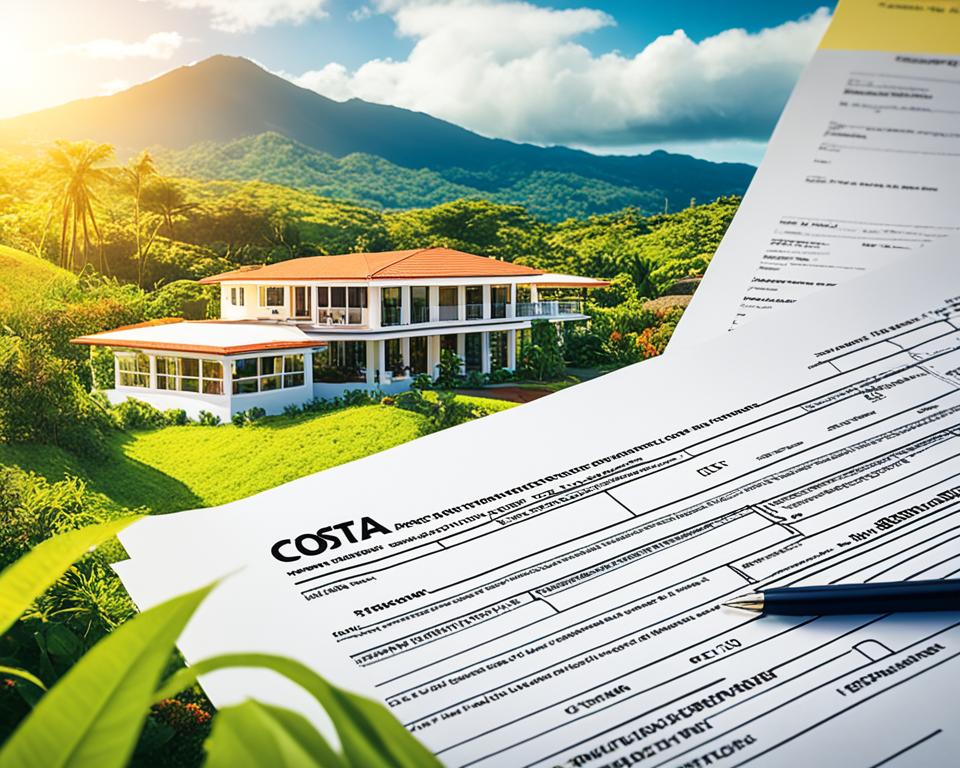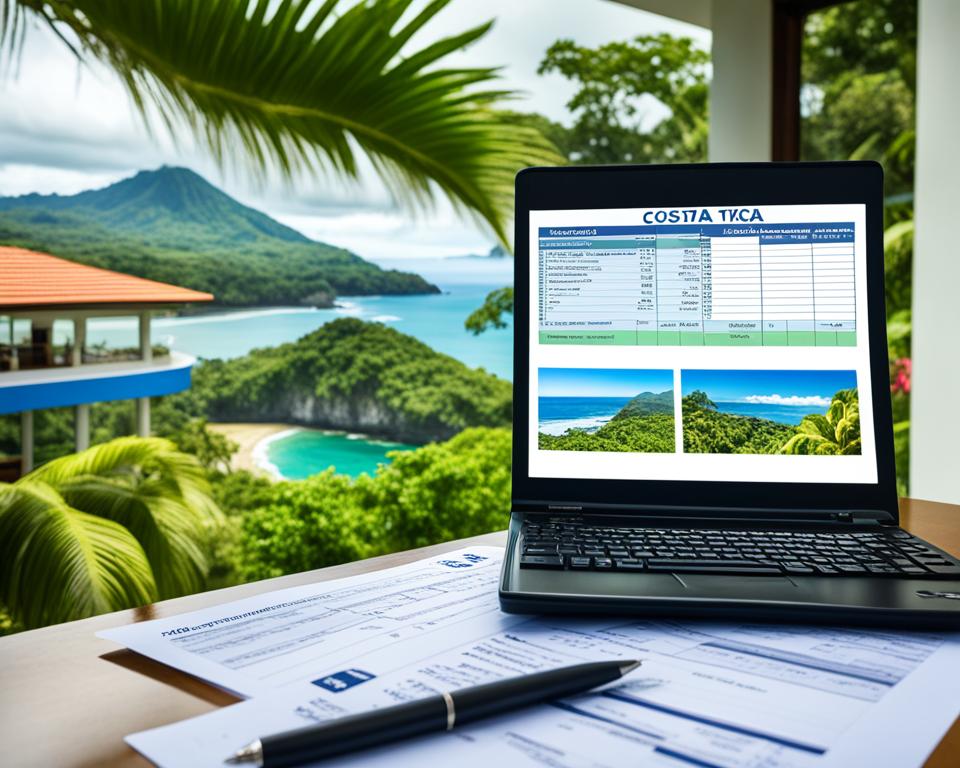
Costa Rica Property Taxes: What You Need to Know
Understanding property taxes in Costa Rica is key for locals and foreign investors alike. The country has a 0.25% municipal property tax. For properties worth over $250,000, there’s an extra “solidarity” or “luxury” tax of 0.25% to 0.55%. It’s vital to grasp the details of Costa Rica’s property tax system if you plan to own real estate here. But, are you aware of all the taxes and penalties you might face as a property owner in Costa Rica?
Key Takeaways
- Costa Rica imposes a 0.25% municipal property tax on all properties.
- High-value properties (over $250,000) are subject to an additional “solidarity” or “luxury” tax ranging from 0.25% to 0.55%.
- Property owners must update their property’s declared value every five years to avoid penalties.
- Foreign investors face additional taxes, including a 3% tax on the assessed value of their properties and taxes on rental income.
- Appealing property tax assessments is possible, but the process can be complex.
Introduction to Costa Rica Property Taxes
Owning property in Costa Rica means you have tax duties to fulfill. A key tax is the municipal property tax, which every property owner must pay. This tax is 0.25% of the property’s declared value each year.
Types of Property Taxes in Costa Rica
There are more taxes for property owners in Costa Rica besides the standard one. For example, there’s a “solidarity” or “luxury” tax on properties worth over $250,000. This tax is between 0.25% and 0.55% of the property’s value.
Owners must declare their property’s value every five years in Costa Rica. This declared value is used to figure out the taxes owed. Not declaring or paying taxes can lead to fines and losing the property.
Importance of Understanding Property Tax Laws
It’s vital to know about property taxes and how they work in Costa Rica if you’re buying real estate. Not following the tax laws can cause big financial problems, like fines and losing your property. Learning about the laws helps owners meet their tax duties and avoid problems later.
Property taxes are key for anyone interested in Costa Rica’s property taxes. Managing these taxes well can help owners keep their investment safe and avoid legal or financial issues.

about Costa Rica property taxes
Costa Rica has a detailed property tax system. It includes various taxes and rules for both locals and foreign investors. You’ll find taxes on property value, rental income, and more.
The municipal property tax is a basic rate of 0.25% of the property’s value. But, if your property is worth over ₡137,000,000 (about $200,000), you’ll pay more. This extra tax is called the luxury property tax.
The solidarity tax hits homes worth over ₡137,000,000 too. It’s a percentage of the property’s value, from 0% to 0.55%. This tax looks at the square footage of your main home and extra buildings like pools.
- You can pay property taxes in January or in four parts throughout the year. This depends on where you live.
- Rental income tax is 15% on what you make from renting out property.
- If you own a property through a company, you’ll face corporate taxes. These can be between $120 and $380 a year, based on your company’s earnings.
It’s key to understand property tax laws in Costa Rica, tax rates for property owners, and property tax exemptions. This is true for locals and foreign property investors. Getting help from a local accountant or tax expert is wise. They can guide you through the taxes and make owning property in Costa Rica smoother.

Property Tax Exemptions and Deductions
Costa Rica has exemptions and deductions for property taxes that can lower the tax load. It’s important for property owners to know about these to save money.
One big exemption is for land used for farming. Farmers can get a tax break, which saves a lot of money. Also, low-income people and families might get tax breaks, easing their financial load.
Homeowners in Costa Rica can deduct some mortgage interest from their taxes. This is great for those with big mortgages or high interest rates.
To make the most of these breaks, use Costa Rica tax calculators or talk to real estate pros or tax experts. Knowing about these savings can help property owners cut their taxes and boost their investment gains.

Getting to know Costa Rica’s property taxes is key for investors and homeowners. Using exemptions and deductions can lower taxes and improve investment plans. With help from Costa Rica tax calculators and experts, property owners can figure out Costa Rica property taxes right and efficiently.
Appealing Property Tax Assessments
If you own property in Costa Rica, you can appeal your property tax if you think the value is too high. Knowing how to appeal and why can help you pay the right amount of Costa Rica property taxes.
Process for Appealing Property Tax Assessments
Appealing a property tax assessment in Costa Rica has steps that differ by area. Here’s what you usually do:
- Write a request to the local assessor’s office, explaining why you’re appealing the assessment.
- Include any documents or proof that show your property’s value is less than the assessed amount.
- Meet with the assessor to talk about your appeal.
- Wait for the assessor’s decision on whether to change the assessment.
Common Grounds for Appealing Assessments
Many property owners in Costa Rica appeal their property tax assessment for good reasons:
- Wrong information about the property, like its size or number of bedrooms.
- The assessed value doesn’t match the property’s real market value, especially if the market has changed a lot.
- The property’s use or status is not correctly recorded.
Understanding how to use the costa rica property tax calculator, residency rules, and property tax laws helps owners pay fair taxes. It also lets them challenge assessments when needed.

Conclusion
Property taxes are key for anyone owning real estate in Costa Rica, for locals and foreign investors alike. While taxes here are lower than in many places, it’s vital to know about the different taxes, exemptions, and how properties are assessed. This knowledge helps us follow the law and keep our taxes low.
By keeping up with local experts and tax rules, we can handle the tax system in Costa Rica well. We need to include the annual property tax of 0.25% of the property’s value in our budget. We also need to think about extra taxes like the Solidarity Tax for Housing Programs. Knowing about tax rates, payment times, and how to appeal them is crucial for good investment management.
Being proactive and keeping up with Costa Rica’s property tax rules is key to making our real estate deals successful. Whether it’s a main home, a vacation spot, or an investment, understanding property taxes is a must. This knowledge is vital for a positive and profitable real estate journey in this lovely country.
FAQ
What are the main property taxes in Costa Rica?
How is the property tax value calculated in Costa Rica?
Are there any exemptions or deductions available for property taxes in Costa Rica?
Can property owners appeal their property tax assessments in Costa Rica?
What are the potential tax implications for foreign investors owning property in Costa Rica?
Source Links
- https://www.specialplacesofcostarica.com/property-management/costa-rica-taxes/
- https://rebeccaclower.com/costa-rica-living/costa-rica-taxes-101-property-import-income-vat-taxes
- https://www.coldwellbankertamarindo.com/article/understanding-property-taxes-in-costa-rica
- https://www.godutchrealty.blog/costa-rica-taxes/all-about-costa-rica-property-tax/
- https://www.coldwellbankersamara.com/article/comprehensive-guide-to-property-taxes-in-costa-rica
- https://osatropicalproperties.com/blog/tax-implications-for-expats-owning-property-in-costa-rica
- https://bluewaterpropertiesofcostarica.com/blog/costa-rica-property-tax-calculate-municipal-luxury-tax/
- https://icsid.worldbank.org/sites/default/files/parties_publications/C3164/Claimants’ Expert Reports and Opinions/140425 FTI ER1 and Exhibits/FTI 28 __www-remax-oceansurf-cr-com.pdf
- https://osatropicalproperties.com/blog/property-taxes-in-costa-rica-plus-luxury-home-tax-and-corporation-tax
- https://www.papagayorealestate.com/taxes-costa-rica
- https://gapinvestments.com/en/property-taxes-costa-rica/
- https://gaprealestate.com/costa-rica-property-taxes/
- https://gap.cr/property-taxes-in-costa-rica/
- https://costaricachristies.com/blog/property-taxes-in-costa-rica-one-more-reason-to-move-here
- https://www.prestigecostaricaproperties.com/costa-rica-property-tax-info
- https://landcolaw.com/real-estate/buying-property-in-costa-rica-what-taxes-must-be-paid/
- https://tamarindorealestate.com/property-taxes-in-costa-rica-tre-blog/
- https://www.gaprealestate.com/costa-rica-property-taxes/
Article by Glenn Tellier (Founder of CRIE and Grupo Gap)
